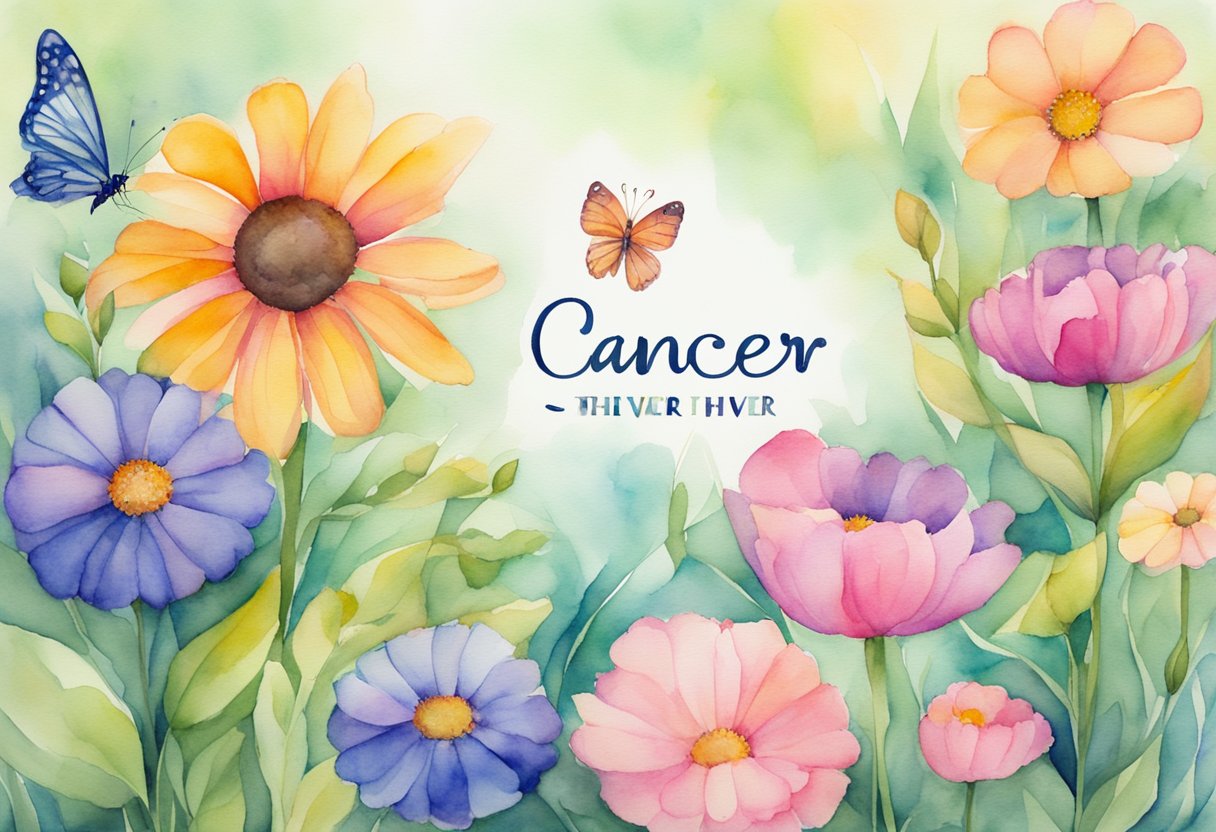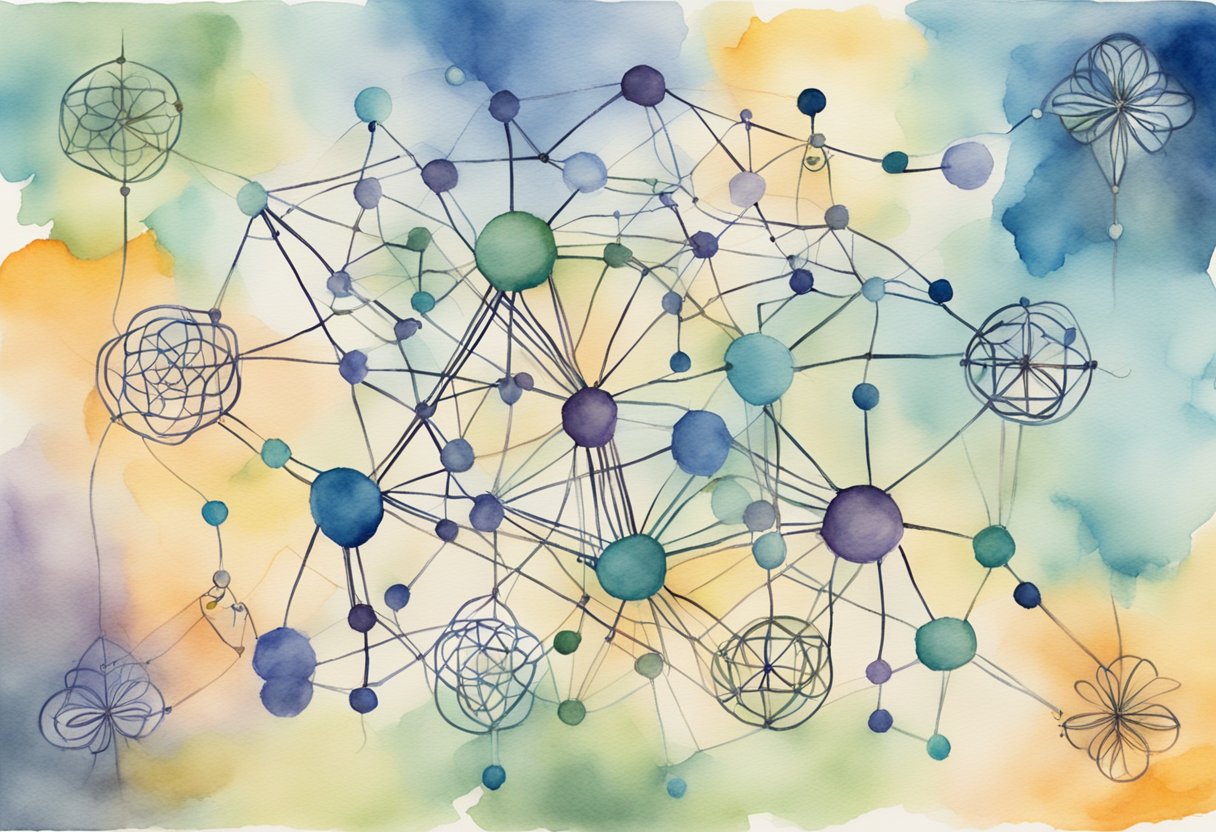Empowerment for Cancer Thrivers

As survivors, overcoming cancer is akin to conquering a series of arduous marathons, each demanding resilience beyond measure. The journey through diagnosis and treatment often culminates in a powerful transformation from patient to survivor.
For many of us men who’ve battled lymphoma, it ushers in an unspoken kinship. We weave affirmations into our daily routine, reinforcing our fortitude and fostering a mindset geared toward thriving post-cancer.
Our path to empowerment goes beyond the physical. It requires a deft balance of nurturing our mental and emotional well-being to reinforce our tenacity. By building a solid support network, we leverage shared experiences and wisdom, which propel us forward. Together, we champion lifestyle choices that celebrate our continued good health, finding camaraderie in activities that push our limits and strengthen our bodies.
Key Takeaways
- Affirmations nurture resilience post-treatment
- Support networks amplify our collective strength
- Healthy lifestyles propel us toward thriving
Understanding Cancer Survivorship

Cancer survivorship stands as an integral part of the journey for those of us who have faced cancer. It’s about the health, wellness, and quality of life after diagnosis.
Defining Survivor and Survivorship
A survivor is any of us who has heard the words “you have cancer” from the moment of diagnosis through the rest of life. Survivorship encompasses the physical, emotional, and social issues of cancer beyond the initial treatment. It includes concerns about follow-up care, long-term effects of treatment, and more.
The Survivorship Care Landscape
The care landscape for survivors offers tailored support for our lasting well-being. It involves regular health check-ups, surveillance for cancer spread or recurrence, and management of treatment side effects. Resources from Cancer Survivorship – NCI details the spectrum of care we should expect post-treatment.
Navigating the New Normal
Post-treatment, we often find ourselves adjusting to a new normal. This phase means re-establishing our routines, managing shifts in relationships, and striving for a lifestyle that sustains our health and reflects our experience as survivors. It’s about crafting a life that celebrates our resilience and harnessing our strengths to support each other, especially for us men who may face unique challenges in this journey. Transition strategies from Cleveland Clinic’s overview on Cancer Survivorship guide this stage.
Diagnosis and Treatment
We navigate a path filled with complex choices from the moment we hear the words “You have cancer.” The treatment adventure begins with a thorough diagnosis identifying what we face and how to overcome it.
Types of Cancer and Treatments
Every cancer diagnosis delivers its unique challenge, whether it’s prostate cancer, colorectal cancer, or gynecologic cancers. Prostate cancer might require surgery or radiation therapy, often with excellent outcomes. Colorectal cancer treatment could involve surgery, chemotherapy, or targeted therapies, depending on its stage and location. Gynecologic cancers cover a range of treatments, from surgery to innovative options like immunotherapy. For each of these, doctors tailor treatments to our body’s needs and the cancer’s specifics.
Creating a Survivorship Plan
A survivorship plan serves as a roadmap once treatment ends. This plan includes follow-up care, potential long-term effects, and health management strategies. It’s a living document that charts our course toward recovery. Emphasizing fitness and wellness routines, we mold our daily lives around activities that sustain our health and spirits. Our support groups encourage conversations among fellow survivors, fostering a community where resilience thrives. Each interaction, each piece of advice, stems from shared struggles and mutual triumphs from our experiences. Together, we build a framework that aims to survive and flourish after our cancer journey.
Challenges of Survivorship
Surviving cancer is a monumental achievement, yet we must acknowledge the road ahead is often paved with ongoing obstacles. From the remnants of treatment’s physical toll to the psychological shadows casting doubt on what tomorrow may bring, our collective journey is fraught with challenges requiring resilience and support.
Physical and Emotional Impact
We often grapple with both the visible and invisible scars left by cancer. Physical ailments like lymphedema and bone loss emerge, demanding constant vigilance and management. Emotional turmoil accompanies these physical hardships, manifesting as anxiety or depression that can grip us when we least expect it. To empower ourselves, we must embrace routines that bolster physical strength and seek therapies to navigate emotional waves.
- Physical Challenges:
- Lymphedema management
- Bone density monitoring
- Emotional Well-being:
- Professional counseling
- Peer support groups
Coping with Recurrence
The specter of cancer returning tests our resolve like few other things can. It casts a shadow that can disrupt our newfound peace, but we refuse to succumb to fear. Instead, we keep a watchful eye for signs of recurrence and maintain regular check-ups, arming ourselves with knowledge and actionable steps should cancer dare to rechallenge us.
- Recurrence Readiness:
- Regular screenings
- Vigilant self-checks
Late Effects and Long-Term Care
Survivorship extends beyond immediate recovery; it includes anticipating late effects and arranging long-term care. This might mean dealing with unforeseen health issues or adjusting lifestyle choices to mitigate future risks. We invest in ongoing medical relationships and become advocates for our continued wellness, knowing our proactive stance is a testament to our strength.
- Ongoing Health Strategies:
- Long-term follow-up clinics
- Adapted physical activities
By confronting these challenges head-on, we exemplify the tenacity of survivors and the collective will to thrive.
Integrative Health Strategies
We understand that thriving after cancer involves more than just medical treatments; it’s about nurturing the whole person. With an arsenal of integrative health strategies, we promote healing, bolster mental health, and continue living our lives with strength and vitality.
Nutrition and Exercise for Healing
Proper nutrition plays a crucial role in our healing process. A diet rich in vegetables, fruits, lean proteins, and whole grains provides the nutrients our bodies need to recover and rebuild. For instance, the antioxidants found in berries and leafy greens can help combat the stress our bodies have endured.
Exercise also forms a cornerstone of our recovery. Regular physical activity helps us regain strength, reduce fatigue, and improve mood. Our routines can include cardiovascular exercises like walking or swimming and resistance training, like weightlifting, to enhance muscle strength.
Mental Health and Counseling Services
Our mental health is just as vital as our physical well-being. Counseling services provide us with an outlet to express our fears and challenges. Sessions with professionals help us develop effective stress management techniques and resilience in adversity.
Self-care routines, including hobbies and relaxation exercises, are a daily affirmation of our commitment to mental wellness. We introduce activities such as yoga or meditation into our routine for an added focus on stress relief and emotional balance. These practices help us maintain a calm center, no matter the turmoil we face.
Survivor Empowerment
As we navigate the journey of survivorship, empowerment emerges as a cornerstone in rebuilding our lives after cancer. Through empowerment, we find the courage and strength to move forward with hope and renewed self-love.

Building Strength and Hope
We often start our path to empowerment by recognizing the resilience that carried us through our difficult lymphoma experiences. Building on this resilience, we create a foundation of strength that supports us in all areas of life.
- Strength: We harness our past adversities to fuel our determination and physical fortitude, engaging in sports that build our bodies and mental toughness.
- Hope: We anchor our future in hope, setting achievable goals and celebrating small victories to maintain a positive outlook. Encouraging each other in men’s support groups, we share strategies that have aided us in overcoming challenges.
Affirmations and Self-Love Practices
Affirmations fortify our self-esteem, reminding us daily of our inherent worth and the love we must nurture within ourselves.
- Self-Love: We practice self-compassion, acknowledging our struggles without judgment and treating ourselves with the kindness we would offer a dear friend.
- Positivity: We cultivate a mindset steeped in affirmations, perhaps using affirmation cards to prompt positive self-reflection and replace fears with empowering beliefs.
Engaging in these practices, we not only enhance our own lives but also inspire fellow survivors to embrace their journeys with courage and self-love.
Support Networks and Resources

In our journey to thrive after cancer, a robust support network can be the backbone of our survivorship.
Connecting with Care Providers and Support Groups
We understand the significance of fostering relationships with knowledgeable oncologists and primary care providers. These professionals are pivotal in devising a comprehensive survivorship care plan tailored to our individual needs. Access to a network of specialists often starts with our primary care doctor, who coordinates our follow-up care and connects us with the necessary resources.
Engagement with support groups offers camaraderie and shared understanding from others navigating similar challenges. These groups, often facilitated by oncology social workers or psychologists, provide a nurturing space to exchange experiences, obtain advice, and reinforce our resolve as thrivers. Reliable information on finding such support groups is available at reputable organizations like the American Cancer Society.
Education and Survivorship Research
Keeping abreast of the latest survivorship research is crucial for us to make informed decisions about our health. Noteworthy updates come from entities like the Office of Cancer Survivorship, part of the National Cancer Institute. This office is dedicated to enhancing the length and quality of life for us as survivors, emphasizing the value of staying educated on advancements in cancer care.
Resources from educational initiatives and reliable research findings help us adapt and manage health changes effectively. For instance, by reviewing the information shared by the National Cancer Survivorship Resource Center, we gain insight into new strategies for managing post-treatment life funded by organizations committed to improving our survivorship journey.
Advancing Beyond Treatment

As survivors, we know that the end of active treatment marks the start of a new chapter, one where lifestyle changes and community engagement play a pivotal role in shaping our continued path to recovery and growth.
Lifestyle Changes and Long-Term Recovery
We embrace a lifestyle that supports our long-term recovery. This includes regular exercise, which might mean joining a local sports team or swimming at the community pool. We keep close tabs on our diet, fueling our bodies with nourishing foods that aid our healing process. We understand the delicacy of this balance, especially for those of us who navigated childhood cancer and now face unique challenges and risk factors as survivors.
Mindful practices such as meditation also become a part of our routine. They help us remain centered and foster a sense of inner peace, which is essential for our psychological recovery. Attendance at follow-up care is non-negotiable, as it allows for the early detection of any recurrent or secondary cancers, ensuring we stay ahead.
Engaging in Community and Advocacy
We find solace and support in sharing our stories. These narratives are not just ours but serve as a beacon for others navigating the cancer journey. By engaging in community efforts and cancer support groups specifically tailored to men like us who have faced this disease, we amplify our experiences to promote awareness and foster compassion.
Participation in advocacy bolsters our community’s strength and drives vital policy changes. We encourage each other to explore avenues such as clinical trials or palliative care programs, creating a collective knowledge base that benefits us all. This engagement also extends to aiding childhood cancer survivors, ensuring they receive the comprehensive care and support needed to thrive post-treatment.
Final Thoughts…

As we reflect on the journey beyond cancer, affirmations serve as a beacon of resilience for us men who have faced the tribulations of lymphoma. Let us embrace a narrative that speaks not just of surviving but of flourishing in the aftermath.
Our shared experiences sculpt a fraternity united by a pledge to support each other through every high and low.
- Embrace Positivity: We use affirmative phrases to set daily intentions, propelling ourselves forward with determination and courage.
- Cultivate Community: Through sport and engaging activities, we build a strong camaraderie that uplifts our spirits and fortifies our will to thrive.
- Nurture Hope: We recognize that our words can heal; speaking life into ourselves and our brothers in this journey nourishes a contagious collective hope.
We carry a wellspring of strength when we vocalize our capacity to thrive. In our gatherings, whether on the playing field or in support groups, we echo the sentiment that challenges are temporary. Through affirmations, we remember that we possess an innate tenacity to surmount the obstacles before us.
As we share our stories, let us be the pillar for those newly diagnosed, demonstrating that beyond the trials of treatment, life burgeons with possibility.
Through our actions and encouragement, we foster a legacy of survival that extends far beyond ourselves to touch the lives of every man grappling with this illness. Let us walk onward with heads held high, our voices reverberating with the powerful truth of our journey — we are more than survivors; we are thrivers. -T
Frequently Asked Questions
What are some powerful affirmations for individuals living with cancer?
“We can conquer each day with strength and courage” might resonate with us as we face our daily battles. This statement galvanizes our will and fortifies our resolve in the ongoing skirmish against cancer.
How can positive messages impact the mindset of a cancer patient?
Positive messages serve as a beacon of hope, fostering resilience within us. They remind us that cancer does not define our worth or diminish our spirit.
What inspiring words can be shared to celebrate a cancer survivor’s journey?
Cheering on a fellow survivor, we might say, “Your courage lights a path for others.” This recognizes the tremendous perseverance required and the inspiration their journey provides.
Can you suggest some strong quotes to support women battling cancer?
In our support groups, we might share, “Your bravery in this challenge inspires us all.” Such quotes offer solidarity, showing women they have a powerful alliance in this fight.
What are some examples of encouragement for someone currently facing cancer?
We can uplift their spirits by affirming, “Every step you take is a victory.” It reminds them that progress isn’t measured in miles but in the simple act of moving forward.
